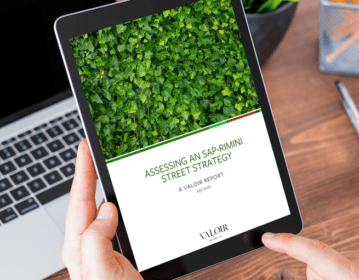
Assessing an SAP-Rimini Street Strategy: A Valoir Report
SAP customers contemplating the transition to S/4HANA have a lot to consider. A move to S/4HANA is more than an upgrade; it’s a new implementation effort, a new platform, and a new database. With costs estimated to be 5 to 7 times current license costs and potential barriers to aligning scarce expertise to make the move with minimal disruption, many customers are searching for options. The Valoir Research report, “Assessing an SAP-Rimini Street Strategy,” helps SAP customers understand the role of independent, third-party support from Rimini Street. In the report, you’ll learn: The current state of SAP software support and licensing burdens The value of stopping the clock on SAP’s planned deadlines to make the S/4HANA move when your business needs dictate – not SAP’s roadmap Ways customers are using liberated resources and budget to help fund digital transformation and accelerate innovation initiatives How Rimini Street independent, third-party support has helped customers reset their SAP relationships to better position themselves for an eventual move to S/4HANA

Rimini Street: What We Do
We don't make ERP or database software like Oracle and SAP. We support and manage that software. Over the past 15 years, we have helped over 3,000 clients save billions of dollars. It's because we are built for support. Built to help clients avoid costly fees and ERP upgrades, so they can innovate and fuel growth. Other companies do software. We do support.

Rimini Street: We Do Support
ERP and database vendors don't want you to know who we are, or that we've saved our clients nearly $5B to date on support fees. Rimini Street is a global partner organizations can trust to help cut costs to drive innovation and growth. Other companies do software. We do support.

Valoir Report: Third-Party Support Goes Mainstream
Adoption of third-party support for enterprise software is now mainstream. In a report sponsored by Rimini Street, industry research firm Valoir analyzed the growing acceptance of third-party support, finding that demand is widespread — from cost-cutters to innovators to a variety of companies in-between. Valoir found that in some instances, even ERP vendors reluctantly acknowledge the utility of third-party support as they focus efforts on the cloud. Third-party support has evolved into a strategic portfolio management tool for enterprise applications, gaining broader strategic acceptance from its origins as a cost containment tactic. Valoir found that its versatility facilitates: Innovation around the edges of a mature, highly functional ERP system Maximizing value from existing investments Taking a measured approach to cloud evolution Digital transformation Tactically, independent, third-party software support helps CIOs save resources and keep IT teams engaged with new initiatives rather than routine support. Strategically, it helps CIOs meet business objectives, demonstrate value, and move to a Business-Driven Roadmap from one dictated by an ERP vendor. In its report, Valoir specifically recognized Rimini Street for its: Breadth of knowledge and depth of support, featuring a dedicated engineer model Pure focus on independent, third-party support versus other IT or consulting services Track record of strong client relationships Value, service, price
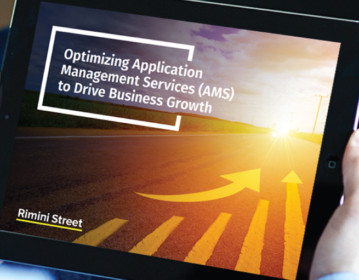
Optimizing Application Management Services (AMS) to Drive Business Growth
In a dynamic business environment, it’s critical to have expert, responsive IT resources available to help maximize productivity and drive growth, often within the constraints of a reduced or frozen budget. Application management services (AMS) seem like a good option to consider on a limited budget. Lower priced plans seem ripe for cost savings, yet traditional AMS models staffed with lower-skilled resources can deliver lower value at higher than expected costs. This results in an AMS “tax” where companies contracting with traditional AMS providers overpay for suboptimal value. Rimini Street has a solution: a single provider, integrated AMS + enterprise software support model that reduces costs and frees up IT teams for critical growth initiatives. Rimini Street support teams resolve incidents and root causes with no ERP vendor dependency, no lower-skilled resources, and no hidden costs. The results: seamless AMS and enterprise software support improved total cost of ownership (TCO) for ERP systems and applications better business outcomes Download the eBook “Optimizing Application Management Services (AMS) to Drive Business Growth” for more information on avoiding the AMS “tax” and funding innovation in a dynamic economy.
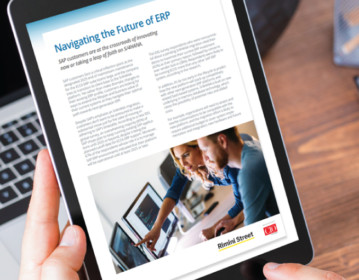
IDG Research Report: “Navigating the Future of ERP”
SAP customers are at a crossroads: innovate now or take a leap of faith on S/4HANA. The end of mainstream maintenance for SAP’s ECC6 ERP suite is scheduled for 2027*. And while SAP is apparently trying to transition its entire client base to the new S/4HANA platform, many customers won’t be pressured to move just because SAP says it’s time. A new IDG global survey reports that 85% of SAP customers surveyed plan to continue running existing SAP applications until 2025 or beyond, despite the impending cutoff date for mainstream maintenance support for ECC6. The survey also reports that although these SAP customers are happy with their current ERP environments, they are also concerned with stagnation, as few innovations and enhancements are being delivered for those systems by SAP. So how can SAP customers innovate, compete, and avoid stagnation without migrating to S/4HANA right now? IDG’s new Market Pulse report, “Navigating the Future of ERP” analyzes this question and details its global survey findings. *On February 4, 2020, SAP had announced mainstream support for SAP Business Suite 7 until 2027.
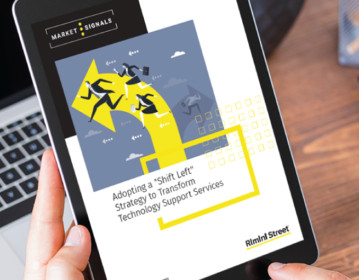
Adopting a “Shift Left” Strategy to Transform Technology Support Services
Thriving in a digital world means technology support providers and in-house IT teams need a collaborative service approach that integrates both technology and the human factor. “Shifting Left” addresses those needs by using software delivery practices to move knowledge closer to customers. Implementing this transformational approach will become critical as organizations turn to technology as a main conduit for meeting customer expectations…without losing the personal touch. But how do you make the shift? Helping you find balance between high-tech and high-touch, Rimini Street invites you to download this comprehensive guide to better understand the Shift Left method and lay the foundation for your transformation. In this ebook, you’ll learn: Three approaches to a Shift Left strategy What’s driving the Shift Left trend The benefits of shifting left and why it makes you more competitive How to embrace and implement your Shift Left strategy
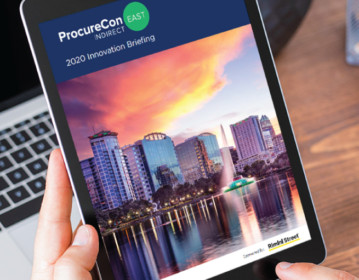
ProcureCon Indirect East 2020 Innovation Briefing
“Procurement is changing. How will your organization hold up?” This is the central question in ProcureCon Indirect East’s 2020 Innovation Briefing, a new report to help procurement leaders create value-driven teams focused on the “wow” of sourcing rather than the “how.” The brief delivers valuable insights into several key considerations for transforming the procurement function: CPOs as Chief Purpose Officers, leveraging sustainable procurement Adopting disruptive technologies to create win/wins with suppliers Implementing supplier-enabled innovation (SEI) to drive growth Overcoming barriers to digitalization Managing procurement talent for the future Leaders who implement these innovation best practices can help transition procurement from a pragmatic, cost-saving back office to a dynamic, strategic partner with IT and the C-suite.
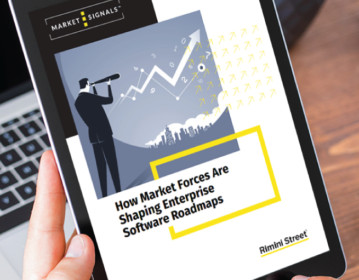
How Market Forces Are Shaping Enterprise Software Roadmaps
Your IT roadmap just got more challenging. Market forces are affecting it, placing a premium on growth and innovation. But if you understand the market forces and plan accordingly, you can achieve growth and innovation—and gain a competitive advantage. Our new research report recommends that when creating or modifying your IT roadmap, account for these market forces: The CIO has a new mandate: become a business-driven thought leader rather than being a caretaker of technology Disruptive technologies, including mobile and the cloud, are pervasive: control the disruption by setting a strategic direction for the digital journey, and choosing the technologies you adopt accordingly IT options are evolving: leverage them to future-proof your enterprise through a hybrid IT environment that combines highly-functional existing systems with new, best-in-class solutions IT operations and support organizations are stressed to meet the business’s demands for technology, so changes must occur: optimize resource allocation—budget and staff—to create new capacity to deliver and support innovation Read full report to learn more about the four market forces and how using a Business-Driven Roadmap—that aligns all IT spending with business goals—can help drive success.


